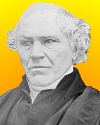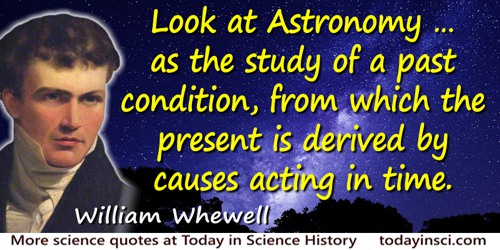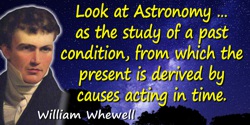 (source)
(source)
|
William Whewell
(24 May 1794 - 6 Mar 1866)
English scholar and philosopher known for his survey of the scientific method and for creating scientific words, including the word “scientist.”
|
William Whewell Quotes on Geology (4 quotes)
>> Click for 64 Science Quotes by William Whewell
>> Click for William Whewell Quotes on | Discovery | Fact | Hypothesis | Knowledge | Law | Nature | Observation | Phenomenon | Science | Truth |
>> Click for 64 Science Quotes by William Whewell
>> Click for William Whewell Quotes on | Discovery | Fact | Hypothesis | Knowledge | Law | Nature | Observation | Phenomenon | Science | Truth |
All palaetiological sciences, all speculations which attempt to ascend from the present to the remote past, by the chain of causation, do also, by an inevitable consequence, urge us to look for the beginning of the state of things which we thus contemplate; but in none of these cases have men been able, by the aid of science, to arrive at a beginning which is homogeneous with the known course of events. The first origin of language, of civilization, of law and government, cannot be clearly made out by reasoning and research; and just as little, we may expect, will a knowledge of the origin of the existing and extinct species of plants and animals, be the result of physiological and geological investigation.
— William Whewell
In History of the Inductive Sciences (1837), Vol. 3, 581.
Astronomy, as the science of cyclical motions, has nothing in common with Geology. But look at Astronomy where she has an analogy with Geology; consider our knowledge of the heavens as a palaetiological science;—as the study of a past condition, from which the present is derived by causes acting in time. Is there no evidence of a beginning, or of a progress?
— William Whewell
In History of the Inductive Sciences (1857), Vol. 3, 516.
Have the changes which lead us from one geologic state to another been, on a long average uniform in their intensity, or have they consisted of epochs of paroxysmal and catastrophic action, interposed between periods of comparative tranquillity? These two opinions will probably for some time divide the geological world into two sects, which may perhaps be designated as the Uniformitarians and the Catastrophists.
— William Whewell
In 'Review of Charles Lyell's Principles of Geology', Quarterly Review (1832), 47, 126.
Time, inexhaustible and ever accumulating his efficacy, can undoubtedly do much for the theorist in geology; but Force, whose limits we cannot measure, and whose nature we cannot fathom, is also a power never to be slighted: and to call in the one to protect us from the other, is equally presumptuous, to whichever of the two our superstition leans. To invoke Time, with ten thousand earthquakes, to overturn and set on edge a mountain-chain, should the phenomena indicate the change to have been sudden and not successive, would be ill excused by pleading the obligation of first appealing to known causes.
— William Whewell
In History of the Inductive Sciences (1857), Vol. 3, 513-514.
See also:
- 24 May - short biography, births, deaths and events on date of Whewell's birth.
- William Whewell - context of quote “Gold and iron…are the rulers of the world” - Medium image (500 x 250 px)
- William Whewell - context of quote “Gold and iron…are the rulers of the world” - Large image (800 x 400 px)
- William Whewell: Theory of Scientific Method, by William Whewell. - book suggestion.




 In science it often happens that scientists say, 'You know that's a really good argument; my position is mistaken,' and then they would actually change their minds and you never hear that old view from them again. They really do it. It doesn't happen as often as it should, because scientists are human and change is sometimes painful. But it happens every day. I cannot recall the last time something like that happened in politics or religion.
(1987) --
In science it often happens that scientists say, 'You know that's a really good argument; my position is mistaken,' and then they would actually change their minds and you never hear that old view from them again. They really do it. It doesn't happen as often as it should, because scientists are human and change is sometimes painful. But it happens every day. I cannot recall the last time something like that happened in politics or religion.
(1987) -- 


